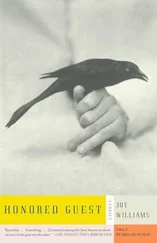Kate doesn’t care. How can it matter? All of her dreams are satisfied. The perils of childhood mean nothing to her. She studies her loafers, but someone guides her gently to her feet and into the kitchen. Someone ladles soup into a bowl for her. “Give the child more than that,” Megan Jones orders. Kate looks up. She shudders. The room vanishes. Only the looming woman remains. An infant hangs from her hip, the tiny feet webbed like a wind-bird’s, moving, making up time. Four o’clock, five o’clock, six o’clock, seven. Then six o’clock, five o’clock, four. Her mother shakes it but it goes on unperturbed through the bottom of its days. It is her mother, lovingly nourishing her, making sure she gets enough to eat. Kate’s hands flail into the soup. She puts it down quickly and her mother disappears. There is simply a neighbor there, smiling and only slightly known, a dish towel bobbing at her side. “Megan!” a voice scolds, “you’ve filled it too high. Here you are, God love you.” An arm comes out of the voice and pours out a bit of the soup into a cup with a handle. A cracker is dropped into it and bobs merrily. The child walks uncertainly into the dining room, searching for her father.
“D’you notice how much Megan Jones resembles the poor Mrs.,” the civil servant, Bolt whispered.
“It happened all at once,” his wife agreed. “It seems there’s always one to give you a start.”
Kate is looking for her father.
“Eternity is forever the glimpse of extirpation in the eye of …”
“Kate,” an elderly woman grasps her arm weakly. Her touch does not even spill the soup. It is vegetable, homemade. The thick pasta letters tack heavily through the red and green. An M floats up in three-dimension. “Kate,” the old woman repeats. Her hand slips to the child’s thumb and waggles it forgetfully. “We have a parakeet, you know. We wish you’d come over and see him. What a little fellow! He’ll be your friend. He’ll take a seed from your lips.”
The thought makes Kate feel sickish. Her eyes rise from the soup, knock against the woman’s smile which is peculiar, her narrow teeth seeming to alternate with another substance entirely, like grout between tile, and settles on the mirror reflecting the food-burdened table. She sees the pink jellied packing of a ham tremble as the woman who looks like her mother sets down a dish of pickles. The sound that it makes as it comes in contact with the platter comes across the room much too late. THLOK.
“Ahhhh,” someone says. “It was a beautiful, beautiful service.”
In the eye of what the child wondered. Ex tir pation in the eye of who?
“He’ll cheer you up,” the old woman was saying. “The best medicine. We got him after they did that operation on John. They hung those bags on him and we both thought we’d die of shame but that budgie’s brought us around. He’s made us smile again.”
The people move in a line around the table, gathering food, choosing and chewing, eating being styptic, a check on the world. It reminded the child of the way they had filed past the coffin. The old woman selects a stumpy piece of celery and spectacularly fits the entire thing in her mouth. Kate slips away but is apprehended almost immediately by a short sad man. Perhaps he has had a little too much to drink but Kate thinks he smells very good. He smells of bread rising. He smells of the water bottled behind the peg they put in the lobster’s claw. Kate has forty-one such pegs in a leather marble bag. She has eaten forty-one lobsters in her life. It seems impossible. Someone must have assisted her. Nevertheless she has the pegs. She has enjoyed them all but her enjoyment is tainted with uncertainty. They are no longer moving through the sea.
“Eat,” the man says morosely. “Eat, now.” He detains her with one hand while, with the other, he fills a plate for her. The hand wrapped around the child’s fingers is cold. It is like a piece of gear. It is nothing personal. It belongs to his job, to his big white boat, to the sea. Somewhere Kate has put down her cup of soup. She sees it close beside her on the tablecloth. She picks it up. Underneath it is a part of a fingernail. Someone’s nervousness. She puts the cup over it again. The man forks food rapidly on a plate. Ham, meat loaf, macaroni, chutney, carrots, fried tomatoes, potato chips, rolls, orange cheese, white butter. The plate is jumbled high with food. There is a ball of stuffing on the very top but there is nothing visible that has been stuffed. There is no turkey. No duck. Suddenly the child’s throat aches uncontrollably. She wants to cry. There is stuffing but no turkey. It is a ball of dirt on top of everything.
She sees her father and hurries over to him. The ache in her throat stops. She sits close to him, resting her head against his arm.
“Whose eyes, Daddy? Whose eyes were you talking about?”
“What, sweet?” His hair is an early and unearthly white. The child had always remembered it being very white and beautiful, folding gently back across the tops of his ears to lie thick and low upon his neck. His fingers were long, the nails slightly dusky, like a woman’s.
“You were talking about eyes. They were very important.”
“Your eyes are the only ones that are important.” He kisses the top of her head. “It’s only what you see that matters to me.…”
Jewel, the man who passed the plate on Sunday, said kindly. “You have beautiful eyes, Kate. Dark hair, blue eyes. You’re going to be beautiful, Kate.”
Embarrassed, she picks an object from her plate and vaguely puts it in her mouth. It is creamy and tastes terrible. She tries to swallow it but it lingers on her tongue. Like the communion bread, she cannot digest it. She has helped her father cut up the latter on Sunday mornings. Tiny, crustless cubes. It is simple grocery fare, slightly stale. Should it not be in the shape of a man? Should it not have the outline of defeat? The suspension of the world must be strong. The child can achieve all worlds but this one. She swallows miserably through the service. Her mother used to give her a mint. She cannot swallow fast enough. There is a limit. The pulp of the bread cube remains behind, girding her teeth, numbing her. Now, this night, she picks up her napkin and grimly excises the thing that is its artifact. It is a struggle. It resists. She knows she has not been altogether successful. She remembers her mother saying, Chew chew chew, you can’t be too cautious. It is a sauced tiny onion. No one has noticed. She looks at her father. He is not eating anything. She shoves the plate quickly and disgustedly beneath her chair.
Kate’s eyes . She is bewildered. Glimpse of ex tri cation in my eyes . “I think I’ll go feed Race now,” she says.
She makes her way through the mourners, wriggling past their legs. A man’s voice rises thinly in the air … “dress up britches like a small hotel …” The people were bumping together and breaking apart. They swung around Kate as she walked to the kitchen. “I read in a magazine where two chinchillas will make you a wealthy man. Two of them. Can raise thousands of dollars of them right in your own bedroom.” The voice was happy with an innocent greed. The child plunges through them. Once, her head is caught for a strange moment between two woolen hips. “Ahhhh, little darling.” Faces lower and low. She is hugged and petted. Kate suddenly feels like a bride. Her fingers smell of gardenias. Her mother had told her sister about blood. Kate had overheard it. She, Kate, will never bleed. This is her wedding day.
A BRIDE IN THE KITCHEN, opening a can of dog food. She picks up a knife and a sack of meal. One door of the kitchen leads outside. She opens this and tramps through the snow around the back of the house to the bulkhead that leads into the cellar. The sky rests on top of her head. Everything is still. The snowflakes falling are very tired and small. Months ago, after the first big freeze, Kate had seen the great geese flying past the moon every night. She had heard their honking, though they were miles high. Now everything is still. The ice is thick on the metal fastenings of the bulkhead doors. If she puts her tongue to them, she’ll be mute forever. They have the power of witches. When the doors give, there is a pleasant thump as the snow slides to the ground and she steps into a warm darkness. She holds the sack in front of her to feel the walls. She guides herself by the beat of the dog’s tail upon her legs. She turns on the light. Race writhes happily before her, picking up a ball, a shoe, a coat hanger, reeling around and around.
Читать дальше












